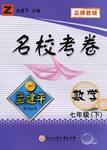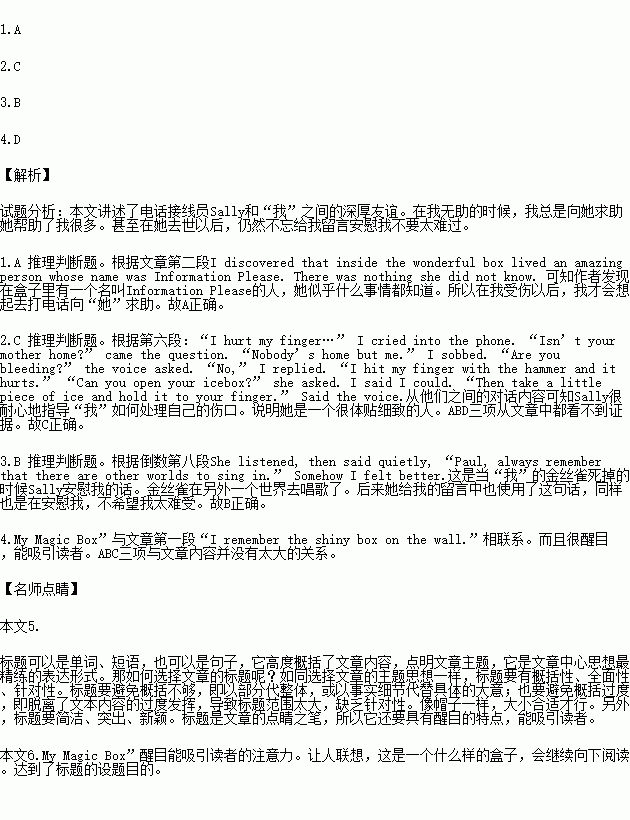题目内容
When I was young, my father had one of the first telephones in our neighborhood. I remember the shiny box on the wall. But I was too little to reach it, I could only listen to my mother talk on it.
I discovered that inside the wonderful box lived an amazing person whose name was Information Please. There was nothing she did not know.
One day my mother went out. I accidentally hurt my finger when I was playing with a hammer. I walked around the house sucking my hurting finger, finally seeing the telephone. Quickly I dragged a chair over and climbed up.
“Information Please,” I spoke into the receiver. A click or two and a small clear voice spoke into my ear, “Information.”
“I hurt my finger…” I cried into the phone.
“Isn’t your mother home?” came the question.
“Nobody’s home but me.” I sobbed.
“Are you bleeding?” the voice asked.
“No,” I replied. “I hit my finger with the hammer and it hurts.”
“Can you open your icebox?” she asked. I said I could.
“Then take a little piece of ice and hold it to your finger.” Said the voice.
After that, I called “Information Please” for everything. I asked her for help with my geography and she told me where Philadelphia was. She helped me with my math. She told me her name was Sally.
Then there was the time my pet canary (金丝雀) died. I called “Information Please” and told Sally the sad story. “Why is it that birds sing so beautifully and bring joy to all families, only to end up as a pile of feathers?” She listened, then said quietly, “Paul, always remember that there are other worlds to sing in.” Somehow I felt better.
One day when I called “Information Please” again, a different voice answered “Information.”
I asked for Sally. “Are you a friend?” she said.
“Yes.” I answered
“I’m sorry to have to tell you this,” she said. “She died five days ago.” Before I could hang up she said, “Wait a minute. Did you say your name was Paul?”
“Yes!”
“Well, Sally left a message for you. The note said, “Tell him I still say there are other worlds to sing in. He’ll know what I mean.” I thanked her and hung up. I knew what Sally meant.
1.When the author hurt his finger, he rang because______.
A. he believed that the telephone knew everything.
B. the telephone could tell him a doctor’s number
C. his mother was on the other end of the telephone
D. he was once told to ask for help in this way
2. Through the help from Sally, it can be inferred that______.
A. Sally was a geography teacher
B. Sally was the author’s friend
C. Sally was a considerate person
D. Sally was an imaginary person
3.What did Sally really mean by her message?
A. She was sure that she could sing in other worlds.
B. She didn’t want Paul to be sad about her death.
C. Singing helped Paul to face death more easily.
D. There was no need for Paul to call her anymore.
4.What is the best title for this passage?
A. My Pet’s Death B. An Amazing Woman
C. A Healing Message D. My Magic Box
 孟建平名校考卷系列答案
孟建平名校考卷系列答案根据所提供语境,用方框中所给短语的适当形式填空。(每题1.5分,共15分)
call … up make one’s acquaintance with set about by means of in vain hesitate for a moment in terms of get through occur to have a great impact on |
1. It was in New York that I first _________ Professor Smith.
2.Though she _________, she finally went in and asked to try on a dress that was expensive.
3.________weather, here is a good place for the tour.
4.The picture _____ him ______ the time when he was brought up in the village.
5.One afternoon she ____ riding without an umbrella and was caught in a storm at last.
6.She told her husband that she couldn’t _____ the rest of the housework without his help.
7.After the quarrel, I tried my best to fix the misunderstanding between us, but all my efforts seemed_________.
8.What the teachers have done _______ their students in the future.
9.Our teachers are trying to improve our English _______ listening, reading, writing and speaking.
10.It _____ me that I had left my suitcase in the taxi, in which I came home yesterday.

